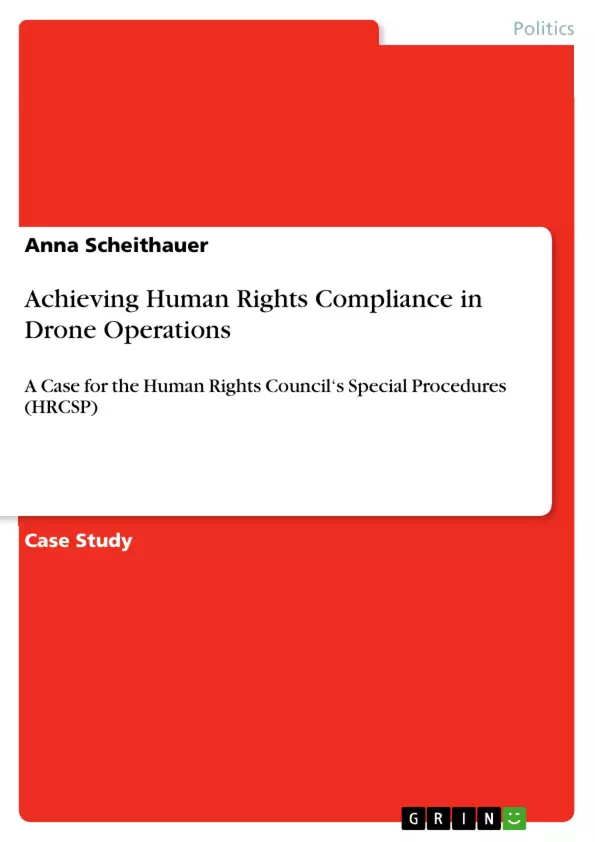In this essay I have argued that the added-value of the HRCSP lies in the special rapporteurs’ (SR) role as facilitators for norm compliance. Doing so, I have focusd on the post-9/11 debate on the use of armed drones for targeted killings in military and counter-terrorism operations. Its main point of contention surrounds the achievement of consistency in legal standards, as well as of coherent policy responses with view to the “war on terror”, which has led some states to prioritize security concerns over human rights (HR) and humanitarian standards. In presenting my argument I have made reference to actor behavior theory to show the nexus between HRCSP and strategic agency. Thereby, I have concentrated on mechanisms of social influence such as coercion, persuasion, incentives, and capacity building as identified by Risse and Popp (R&P). (2013, 12-22) Also, I have addressd the element of acculturation, found as a major force for compliance by Goodmann and Jinks (G&J) (2004), and touch on domestic mechanisms, such as executive power, litigation, and group demands (Simmons, 2009), and the power of domestic constituencies (Dai, 2004). During the analysis, I have been mindful of a possible crowding-out effect as suggested by G&J, where one social mechanism could negatively affect the operation of another. (2013, 105) In this sense I have elaborated on the opportunities and challenges of the HRCSP regarding compliance with the right to life in human rights law (HRL) and humanitarian law (IHL) with view to targeted killings. I have focused on the HRCSP because they embody the permanent tools of the Human Rights Council (HRC) composed of independent experts, compared to the Universal Periodic Review (UPR), which, due to its politicized nature, is rather silent on the subject matter. The analysis has shown how the Special Rapporteur for Extrajudicial, Summary and Arbitrary Executions (SRESAE) and the Special Rapporteur on Terrorism and Human Rights (SRTHR), in concerted action and by application of various elements of socialization, facilitate the compliance process. I have concluded that the SR are not an end but a means for achieving compliance. There is also no one solution regarding the socialization process, which seems to strongly depend on the right sequencing of elements sensitive to certain scope conditions and the level, or “continuum of commitment” (Dai, 2013, 86-87), states prescribe themselves to depending often on domestic mechanisms of influence
Inhaltsverzeichnis (Table of Contents)
- Achieving Human Rights Compliance in Drone Operations: A Case for the Human Rights Council's Special Procedures (HRCSP)
- 2HRCSP: Facilitators for Norm Compliance
- Compliance with Non-Reciprocal HR Treaties: Explaining the Paradox
- The Human Rights Council’s Special Procedures (HRCSP) in Action: Facilitating Compliance
- Conclusion
Zielsetzung und Themenschwerpunkte (Objectives and Key Themes)
This essay argues for the role of the Human Rights Council's Special Procedures (HRCSP) as facilitators for norm compliance in the context of targeted killings carried out by drones, particularly in the post-9/11 "war on terror" context. The author aims to show how the special rapporteurs (SR) can utilize various mechanisms of social influence, including persuasion, coercion, incentives, and capacity building, to achieve compliance with international human rights and humanitarian law.
- The role of the HRCSP in facilitating norm compliance
- The application of actor behavior theory to understand state compliance
- The use of various socialization mechanisms, including persuasion, coercion, incentives, and capacity building
- The challenges and opportunities of the HRCSP in achieving compliance
- The need for independent experts with strong mandates in the post-9/11 context
Zusammenfassung der Kapitel (Chapter Summaries)
- The introduction sets out the argument that the HRCSP can play a valuable role in facilitating compliance with international human rights and humanitarian law in the context of drone operations, particularly with regard to the right to life.
- Chapter 2 discusses the theoretical framework of actor behavior theory, highlighting various socialization mechanisms, such as coercion, persuasion, incentives, and capacity building, that can influence state behavior.
- Chapter 3 examines the specific case of targeted killings and the challenges of achieving compliance with international law in this area. The author explores the potential for the HRCSP to utilize their mandates and tools to facilitate norm compliance.
Schlüsselwörter (Keywords)
Key keywords and focus topics include human rights compliance, drone operations, targeted killings, special rapporteurs, actor behavior theory, socialization mechanisms, coercion, persuasion, incentives, capacity building, human rights law, humanitarian law, post-9/11 context, and the "war on terror".
Frequently Asked Questions
What is the role of Special Rapporteurs in drone operations?
Special Rapporteurs (SR) act as facilitators for norm compliance, helping states align their drone-based counter-terrorism operations with international human rights and humanitarian law.
How does actor behavior theory explain compliance?
The theory identifies social influence mechanisms such as coercion, persuasion, incentives, and capacity building that encourage states to follow international norms.
What is the conflict between security and human rights in the "war on terror"?
Post-9/11, some states have prioritized security concerns over human rights standards, leading to controversies regarding targeted killings and the right to life.
What is the "crowding-out effect" in socialization mechanisms?
It refers to a situation where one social mechanism (like coercion) might negatively affect the operation of another (like persuasion), potentially hindering overall compliance.
Why are HRCSP considered more effective than the UPR for this topic?
The Human Rights Council's Special Procedures (HRCSP) consist of independent experts, making them less politicized and more focused on specific legal violations than the Universal Periodic Review (UPR).
- Citation du texte
- Anna Scheithauer (Auteur), 2015, Achieving Human Rights Compliance in Drone Operations, Munich, GRIN Verlag, https://www.grin.com/document/350574



